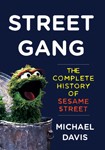In How We Got to Sesame Street; Art on Screen (The Chronicle of Higher Education. January 16, 2009), Evan R. Goldstein treats us to some of the history of Sesame Street, which celebrated 40 years on November 10.
In 1966 a group of friends gathered for a dinner party in Manhattan. As the evening was winding down, one of the guests, Lloyd N. Morrisett, a vice president at the Carnegie Corporation, turned to his host, a television executive named Joan Ganz Cooney, and asked a seemingly innocuous question: Can television educate young children? …
Almost four years after the Cooney dinner party, on November 10, 1969, Sesame Street showed up on public television across the country. The series was greeted with a torrent of gushing reviews. “The show moves, seduces, diverts, dazzles, amuses, and infects,” raved a writer at Variety. “Learning seems almost a byproduct of fun,” noted another critic. Children’s television would never be the same.”
It’s hard not to concede that education begins in the context of where one grows up and TV viewing is almost universal among the kids in our culture. As such, would you credit Sesame Street or similar TV shows for your early childhood education (or at least some of it)? Does Sesame Street Turns 40, But It Doesn’t Look a Day Over 25 resonate with you?
In the last 40 years, Sesame Street taught us to celebrate our differences, to bask in our own individuality and has continuously redefined “normal” to fit us all. Sesame Street taught us to read, to write, and yes, to count. It opened our eyes to cultures beyond our cul-de-sac and taught us global thinking. Sesame Street made us believe that we could be anything and that anything was possible. Sesame Street taught us to love music and laughter and learning.
A couple more questions to ponder/discuss:

- How much emphasis should parents or the educational system as a whole place on educational TV for kids, youth, young adults, adults?
- What has the educational experiment shown us about what kids can/do learn from TV? Do they learn/absorb more than the basics, e.g., values, perspective on the real world?
- Would you agree with the Robert Smith’s 40 Years Of Lessons On ‘Sesame Street’, which ran on NPR yesterday (11/10/2009)? E.g., Children Are Adaptable. Keep It Simple. The Children are always right (Note: Bonus on audio).
- As one involved in higher education, do you have any recommendations for the next decade of Sesame Street as it seeks to educate kids across the spectrum or for parents as they seek to evaluate it’s role in the overall educational toolkit? Note: Sesame Street provides a peek of it’s future direction at It’s all new and better than ever as Sesame Street turns 40!
P.S. Street Gang: The Complete History of Sesame Street (Michael Davis. Viking. 2008) looks like a good read. I found an excerpt posted here.
Tom enjoys daily conversations regarding living out the Biblical Story with his wife Theresa and their four girls, around the block, at Elizabethtown Brethren in Christ Church (where he teaches adult electives and co-leads a small group), among healthcare professionals as the Northeast Regional Director for the Christian Medical & Dental Associations (CMDA), and in higher ed as a volunteer with the Emerging Scholars Network (ESN). For a number of years, the Christian Medical Society / CMDA at Penn State College of Medicine was the hub of his ministry with CMDA. Note: Tom served with InterVarsity Christian Fellowship / USA for 20+ years, including 6+ years as the Associate Director of ESN. He has written for the ESN blog from its launch in August 2008. He has studied Biology (B.S.), Higher Education (M.A.), Spiritual Direction (Certificate), Spiritual Formation (M.A.R.), Ministry to Emerging Generations (D.Min.). To God be the glory!

For extra credit reading (it’s so rare that I get to suggest such a thing for Emerging Scholars!) – Malcolm Gladwell has an excellent chapter comparing Blue’s Clue’s to Sesame Street in his book “The Tipping Point.” (The whole of Tipping Point is an excellent read, really.) The chapter addresses the first couple questions you pose, by investigating the “stickiness,” or how much the kids actually remember from the programs.
Google Books it seems has excerpts from the chapter online. Page 99-102 touch on how revolutionary the idea of Sesame Street was. Page 103-109 are about experiments investigating what kids get out of Sesame Street. Page 110 starts the discussion on Blue’s Clues. http://books.google.com/books?id=MMlxzMNkE_0C&pg=PA89&lpg=PA89&dq=blue%27s+clue%27s+sesame+street+malcolm+gladwell&source=bl&ots=hg1COHlFE5&sig=-KDC8Hw6JdSLw8mZmL_6GP_zOMQ&hl=en&ei=U9r6SoHwONCkngfv1P2IDQ&sa=X&oi=book_result&ct=result&resnum=1&ved=0CAoQ6AEwAA#v=onepage&q=&f=false
Thank-you Amy! Great material.
BTW, last night I saw a “News Hour” reflection/conversion on Sesame Street, http://pbs.vo.llnwd.net/kip0/newshour/rss/media/2009/11/10/20091110_sesame.mp3 … This included a snippet of the “Sesame Street Special Report – Cookiegate,” http://www.youtube.com/watch?v=k54Juj1Bv8A [Note: will Polish subtitles], which exemplifies the attempt to engage the parental audience with Sesame Street characters. But how many parents have the time/energy/interest to watch and discuss educational programming with their kids? Yes, Blue’s Clue’s took the revolutionary Sesame Street by storm. How will the new and improved Sesame Street compete with a growing field of contenders?
Link to Cookiegate updated: 3/21/2011. 9:09 EST.
I’d never seen the Cookiegate skit, that was great!
Re parents having the time/energy/interest to watch educational programming: This is just anecdotal, but I do remember watching the Sesame Street skit “Letter B” when I was little, and my mom excitedly running out of the kitchen to watch with me because she loved the Beatles when she was younger.